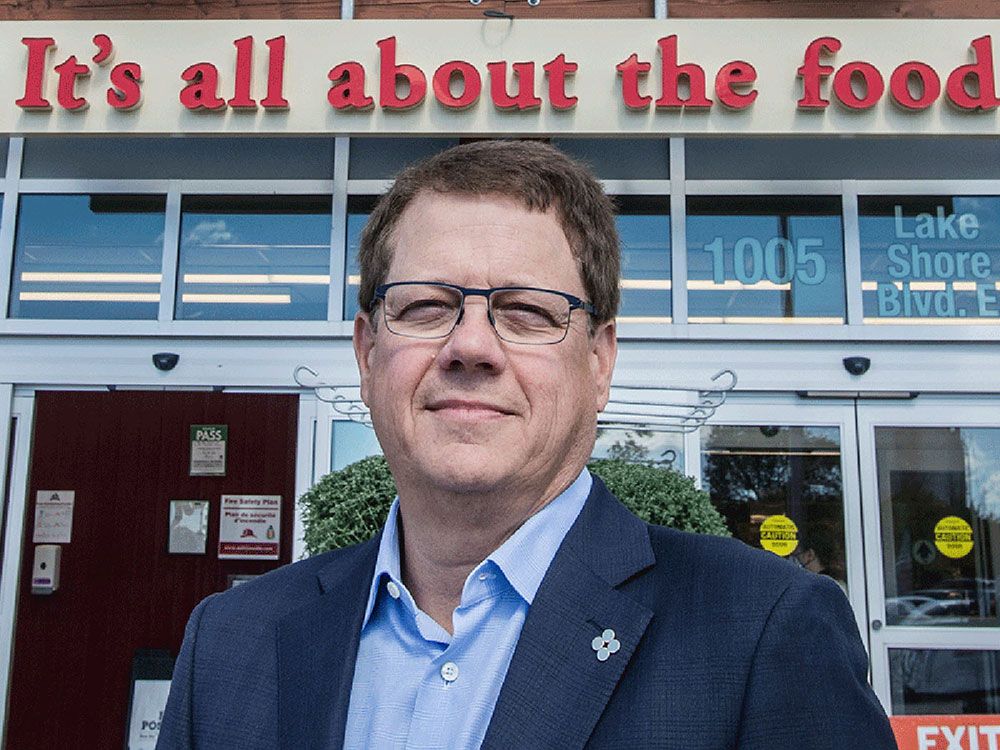‘Quite frankly, I am tired of these armchair quarterbacks’
Publishing date:
Sep 15, 2022 • 20 hours ago • 4 minute read • 135 Comments
Empire CEO Michael Medline fired back at critics who suggest Canada’s big grocers are exploiting their market power to profit from inflation. Photo by Postmedia The head of Canada’s second-largest grocery chain called suggestions the country’s big grocers are exploiting their market power to profit from inflation “reckless” and “incendiary,” and characterized the critics who are making such assertions as lazy “armchair quarterbacks” who know little about the food business.
Advertisement 2 This advertisement has not loaded yet, but your article continues below.
Michael Medline, chief executive of Empire Co. Ltd., which runs 1,600 stores under the Sobeys, Safeway, FreshCo, IGA and Farm Boy banners, made the unusually impassioned remarks at his company’s annual general meeting on Thursday. Earlier, Stellarton, N.S.-based Empire reported net income of $187.5 million in its most recent quarter, little changed from a year earlier.
Financial Post Top Stories Sign up to receive the daily top stories from the Financial Post, a division of Postmedia Network Inc.
By clicking on the sign up button you consent to receive the above newsletter from Postmedia Network Inc. You may unsubscribe any time by clicking on the unsubscribe link at the bottom of our emails. Postmedia Network Inc. | 365 Bloor Street East, Toronto, Ontario, M4W 3L4 | 416-383-2300
“Quite frankly, I am tired of these armchair quarterbacks who make little effort to understand even the basics of our business but are comfortable sitting on the sidelines pontificating about how Canadian companies are reaping unreasonable profits on the backs of inflation,” Medline told shareholders assembled at a movie theatre in New Glasgow, N.S.
Advertisement 3 This advertisement has not loaded yet, but your article continues below.
“This is absolutely not true,” he continued. “These reckless and incendiary attacks are meant to divide us, and sit in stark contrast to the collaboration and problem solving that we experienced in the darkest moments of the pandemic.”
Medline’s remarks represent the most aggressive attempt yet by anyone in the grocery business to push back against a summer of bad press that stoked resentment among customers and threatens to attract the attention of politicians who have demonstrated a newfound interest in competition policy.
Canada’s big grocers have faced blowback in recent months for posting profit gains as shoppers faced the highest grocery inflation since the 1980s. Empire and its main rivals in the industry — Loblaw Companies Ltd. and Metro Inc. — have all dismissed the criticisms as unfounded and misguided. That didn’t stop the swirling accusations of corporate greed from turning into a public relations headache for the industry, which was only just shaking off the Hero Pay scandal of 2020 — not to mention an ongoing federal investigation into an alleged scheme to fix the price of bread and a protracted government campaign to stop grocers from bullying their suppliers.
Advertisement 4 This advertisement has not loaded yet, but your article continues below.
David Macdonald, an economist at the Canadian Centre for Policy Alternatives, has written that excess corporate profits and fatter margins in the food business were driving up inflation. A Toronto Star investigation published in July came to a similar conclusion. And last month, the Financial Post worked with accounting and auditing experts to analyze financial statements from the top three grocers, and found a more complicated picture than the one drawn by Macdonald and the Star.
The scrutiny was being stoked by “a handful of politicians, media sources and think-tanks — not because we are struggling, but for being too successful in this difficult environment of high inflation,” Medline told shareholders. “I guess it makes for easy headlines and ignores what is truly driving our success,” he added. “I refuse to apologize for our success.”
Advertisement 5 This advertisement has not loaded yet, but your article continues below.
Empire has previously said its margin and earnings are getting better, in part, because of its three-year Project Horizon strategy to expand its FreshCo and Farm Boy brands, while using e-commerce and analytics to drive profit growth.
In an earnings update before the annual meeting, Empire reported that profits actually dipped slightly in its first quarter, despite a boost in sales.
Sales in the quarter ended Aug. 6 increased 4.1 per cent compared with the same period last year. The jump came from higher food and fuel sales, which were influenced by this year’s surge in commodity prices, as well as its expansion of FreshCo in Western Canada, the company said.
Discount stores such as FreshCo have been siphoning sales away from more conventional grocers this year, because more shoppers are seeking bargains as household food bills climb higher and higher. In its latest consumer price index last month, Statistics Canada found grocery prices were up 9.9 per cent year-over-year in July.
Advertisement 6 This advertisement has not loaded yet, but your article continues below.
But Empire’s profit was $187.5 million, down $1 million or 0.5 per cent compared to last year. Earnings per share was 71 cents in the quarter, below forecasts of 74 cents, but one cent higher than the previous year. RBC analyst Irene Nattel said the results were “solid,” despite Empire coming up short on EPS expectations.
Recommended from Editorial Are Canada’s big grocers profiting off inflation? The answer is complicated Loblaw suspects food inflation crisis may have finally peaked The company took a slightly slimmer margin in the quarter, which it partly blamed on higher supply chain costs. Empire’s gross margin — a measure of the profit the chain has left over after accounting for the cost of buying goods and running the stores — dropped to 24.9 per cent from 25.1 per cent last year. The company said its gross margin would be 63 basis points higher than last year, if not for the impact of fuel sales.
• Email: jedmiston@nationalpost.com | Twitter: jakeedmiston
